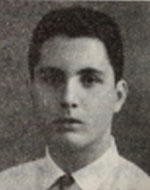Amnon, son of Ruth and Asher, was born on the 21st of Tevet 5708 (January 3, 1948) in the Dovrat group. He studied at an elementary school in Paris, France, and at the Dubnov elementary school in Tel Aviv. Afterward, he continued his studies at the Tel Aviv Municipal High School, the sociological track and the Arda International School in the Netherlands. Amnon was born in a group at the foot of the Gilboa, during the battles in the area, and when he was three months old, he and his children were evacuated to Geva. During his second life Amnon was in Paris from age three to five in Geneva, from the age of nine to eleven in Paris, and when he reached his seventeenth year his father was appointed Amnon graduated from the International School in Holland, where he studied for a matriculation certificate, and was a member of a group of Israeli children, in which the group was divided according to the level of “Israeliness.” Amnon was the most up-to-date And soon became the first in conversations and debates on various issues related to Israel Very much to Israel, even though he spent years abroad. On the contrary, his longing for her increased and he saw in an ideal light everything related to the country. When he returns to Israel and encounters reality, he can not accept it. His natural tendency to criticism arose and he shut himself up. After finishing high school, Amnon returned to Israel to join the army. In his letters from the Netherlands to his girlfriend from the school in Israel – whom he married before he completed his regular service – Amnon expressed his love for Israel and his bitterness over not being allowed to participate in the Six-Day War alongside his friends. Amnon was drafted into the IDF at the end of July 1967. After completing basic training, he completed a tank course for tank commanders, officers’ training, and a course for armored corps officers, He continued to serve in the same battalion, and was later promoted to lieutenant, and his commander pointed out that he was a good officer, alert to the company’s problems, he treated his subordinates with determination, he was loyal and tried to succeed, even though he was about to be released from the army. It was noted that he was responsible and reliable, an initiator, a personal example of his subordinates Before he was drafted into the army, Amnon, who was an individualist in his nature, feared military conversion, and at first he had to deal with everyday problems, but when he was held responsible, he devoted himself to his job. After completing his regular service, Amnon was assigned to reserve duty as commander of the tank division of another battalion, after which he was accepted to economics studies at the Hebrew University of Jerusalem, where he began his studies with momentum and energy and at the same time worked. At first he worked for the Jerusalem Municipality in the housing renovation department. The work excited him, for he saw it as a chance to change the environment and help others. After a while he began working as an economist at the Bank of Chicago, which opened in Jerusalem. He invested all his energies in the work, and his employers’ great appreciation of him increased his enthusiasm. Amnon completed his undergraduate studies, and in May 1974, after his fall, he received a BA in Social Sciences from the Hebrew University of Jerusalem. On the morning of Yom Kippur they told Amnon to wait for a ride to his unit. He packed his bags and was ready, and when the war broke out and the transport was too late, he called his base again to expedite his departure. In the evening they came to take him and he was sent to the Golan Heights for the braking battles. the following day, On the 7th of Tishrei 5740 (7.10.1973), led a company of tanks, which stormed Cindyana, near Nafah. His tank was hit by a shell and Amnon was killed. He was laid to rest in the military cemetery in Kiryat Shaul. Survived by a wife, parents and sister. In a letter of condolence to the bereaved family, the unit commander wrote: “Amnon was an outstanding commander of the platoon, dedicated and loved by his soldiers and commanders.” The Hebrew University of Jerusalem has published a pamphlet called Nizkor, in memory of its fallen soldiers in the Yom Kippur War, and includes things about it.
